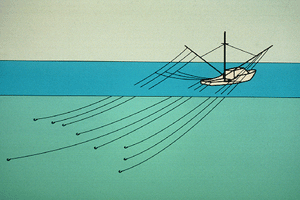Actually, our bodies have not “evolved”.
Our bodies have changed very little in many thousands of years, but we have massively changed our environment and created an artificial/away from nature world with lots of food available 24/7/365 and which we do not have to expend any/much energy to obtain. Plus we have introduced ideas that are foreign to our body such as eating every day, eating 3-4-5 times a day, snacking, parties, weddings, eating out, etc., plus eating meat every day, perhaps more than once too.
Plus, when we eat with others, we are highly likely to eat more (the more people we are with, the more we are likely to eat).
Add to that is the problem of most people never fasting in their lives (overnight does not count) and the build up of toxins, cell garbage and other waste material that is created continuously, never gets expunged from the body (through autophagy), so it just sits there and is one of the main reasons for aging.
In addition, we have invented frankenstein/fake foods which do not exist in nature and which the body does not know how to deal with. This results in damage, toxicity, inflammation and more.
Even if the ingredients of a fake food do exist in nature, putting them together in an unnatural way is also damaging to our bodies and creates the same effects as above, as well as causing addiction and weight gain/obesity.
The fake food industry has hijacked our brain’s circuits by designing highly addictive and high caloric foods. Our brains respond very favorably to caloric rich foods, because many thousands of years ago, when such foods were found, it was rare and we took advantage of it, like other animals do today. And the brain remembers where that food was found, so we went back there in the future to see if any more is there. In modern times, with our brain and tastebuds hijacked, we know where that pizza place, is, the burger/fries/donuts store is and also, these foods are created to cause addiction, hence why so many people are overweight.obese and have T2 diabetes, as well as other illnesses.
Also, removing elements of a natural food, like oil from olives/seeds causes the same problems.
Consuming these oils are fine, when they are in their natural state within the natural food, because real foods have evolved over millions of years (as has our biology) and each element of a food is in the evolved & correct proportions to each of the other elements.
So eating an olive/nut/seed is far better than consuming just the oil/adding it to food/cooking with it. Adding oil to food, or cooking with it, is highly damaging to us. The extra virgin olive oil craze is just one big scam, just for profit of course. And the theory/belief that the mediterranean diet is great is not because of olive oil - its because people in those countries eat lots of veggies.
I did not say we eat grass, so do check what you read before you write.


